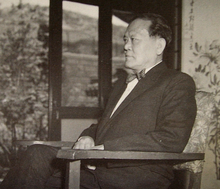You can help expand this article with text translated from the corresponding article in Korean. (November 2021) Click for important translation instructions.
|
| Chough Pyung-ok | |
|---|---|
 | |
| Personal details | |
| Born | (1894-05-21)May 21, 1894 Cheonan, South Chungcheong Province, Joseon |
| Died | February 15, 1960(1960-02-15) (aged 65) Walter Reed Army Medical Center, Washington, DC, United States |
| Cause of death | Stomach Cancer |
| Political party | Democratic Party |
| Spouse | No Jeong-myeon 노정면 (盧禎冕) |
| Korean name | |
| Hangul | 조병옥 |
| Hanja | 趙炳玉 |
| Revised Romanization | Jo Byeong-ok |
| McCune–Reischauer | Cho Pyŏngok |
| Art name | |
| Hangul | 유석 |
| Hanja | 維石 |
| Revised Romanization | Yuseok |
| McCune–Reischauer | Yusŏk |
Chough Pyung-ok (Korean: 조병옥; 1894 – 1960) was a South Korean politician. He ran against incumbent president Syngman Rhee in the 1960 presidential election but died on February 15, one month before the election on March 15. Rhee received 90% of the vote. He was the first Director of the Korean National Police from 1945 to 1949 and Minister of Home Affairs during the early stages of the Korean War.
Biography
Born in Mokcheon, a neighbourhood in Cheonan, Chungcheongnam-do, in 1894, Chough's family was wealthy and in 1914, sent him to the United States for his education. He attended a high school in Kingston in the state of Pennsylvania before going on to study at Columbia University in New York. He graduated with a Bachelor of Arts in 1922 and proceed to gain a Doctorate in Economics in 1925.
On completing his tertiary education, Chough returned to Korea and worked as a teacher at Chǒson Christian College. A nationalist, he was imprisoned in 1929 by the Japanese authorities for his activities. In September 1945, following the end of the Japanese occupation, he was one of the founding members of the conservative Korean Democratic Party (KDP). The following month, under the American Military Government, established to control the southern half of Korea as it prepared for independence, Chough became director of the Korean National Police; he was selected for the role by the Americans. In some quarters of the American Military Government there was dislike for his harsh methods against Korean communists, but he was otherwise deemed to be capable.
Following the establishment of the Republic of Korea (ROK) in 1948, Chough was the country's representative to the United Nations. He was also an emissary for Syngman Rhee, the country's first president. In July 1950, he was appointed Minister of Home Affairs. With the ROK now embroiled in a conflict with North Korea, following the latter's invasion of the south, he worked to boost the numbers and provisions of the KNP. Much of the KNP's work involved dealing with North Korean infiltrators that were moving to the south, hidden amongst refugees. By November 1950, he claimed that the KNP had arrested over 55,000 "collaborators and traitors". He fell out with Rhee after the Geochang massacre; Rhee had interfered with the resulting investigation and released the perpetrators under an amnesty. In early 1951, Chough resigned his ministerial post in protest.
He continued to be critical of Rhee, particularly at time of the latter's unilateral decision in mid-1953 to release North Korean prisoners of war during the armistice talks at Panmunjom. Chough argued that this negatively impacted the ROK's diplomatic relationships. By 1956, he had risen to be head of the KDP. In the 1960 presidential election, Chough was the KDP's candidate for the presidency of the ROK, opposing Rhee.
Death
Partway through Chough's 1960 campaign, he became ill with cancer. He was taken to the United States for medical treatment at Walter Reed Army Medical Center in Washington, DC, but died there on February 15, 1960.
Works
In popular culture
- Portrayed by Kim Mu-saeng in the 1981–1982 TV series 1st Republic.
Notes
- also Cho Pyung-ok or Cho Byeong-ok
References
- ^ Matray 1991, pp. 95–96.
- Cumings 1997, p. 438.
- Cumings 1997, p. 193.
- Cumings 1997, pp. 200–201.
- Cumings 1997, p. 203.
- Cumings 1997, p. 282.
- Matray 1991, p. 230.
- Kim 2018.
Sources
- Cumings, Bruce (1997). Korea's Place in the Sun: A Modern History. New York: W. W. Norton & Company. ISBN 0-393-31681-5.
- Matray, James I. (1991). Historical Dictionary of the Korean War. New York, New York: Greenwood Press. ISBN 978-0-313-25924-1.
- Kim, Gyeong-ae (4 March 2018). "첫 정치 드라마 '제1공화국'…첫 녹화장에 사장까지 출동했다" [The president of MBC himself visited the first shooting of first political drama 1st Republic]. The Hankyoreh (in Korean). Retrieved 5 April 2023.
External links
- Cho Byeong-ok (in Korean)
- Cho Byeong-ok (in Korean)
- Cho Byeong-ok (in Korean)
- Cho Byeong-ok (in Korean)
- Cho Byeong-ok (in Korean)
- 1894 births
- 1960 deaths
- Korean politicians
- South Korean anti-communists
- South Korean Roman Catholics
- Kim Kyu-sik
- Philip Jaisohn
- Yun Chi-ho
- Korean educators
- Columbia Graduate School of Arts and Sciences alumni
- Democratic Party (South Korea, 1955) politicians
- Members of the Provisional Government of the Republic of Korea
- Korean expatriates in the United States